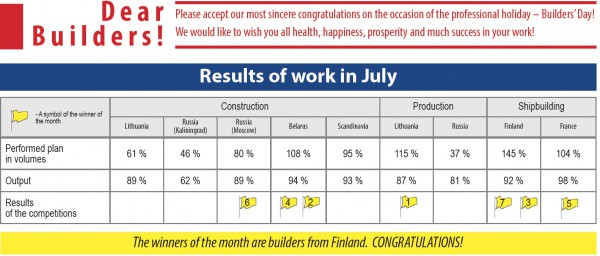Lithuanian company, Litana, pays its workers EUR 3,3 – 4,3 per hour when working abroad. The company is working in shipyards in France, Finland and the Netherlands and in the nordic countries with construction work.
UAB Litana ir ko is a large group of companies that have about 1,200 employees. Two of their factories design and produce steel structures, one in Klaipeda, Lithuania, the other in Belarus. In addition, several hundred employees work in ship building and repair in the shipyards in France, the Netherlands and Finland. Litana also work in construction in Sweden, Norway and Finland. Litana use workers from other companies in the group when working abroad.
”If we need to speed up a job we take employees from Kaliningrad and Ukraine” said the vice president of Litana, Mr Viktoras Skuodas, as we meet him in Lithuania a year ago.
Soviet
Despite the fact that Lithuania was the first country among the Baltic States to declared freedom from the Soviet Union, Litana approach is very much “Soviet”. In Litanas monthly newsletter the producion goals are listed and how different groups of workers have fullfilled their goals. The group of workers that have achieved the most are declared ”the winnner of the month”. However, the workers are not rewarded finansially, just with hard work. 

A welder, Andrius, (fictitious name) has worked for Litana in Sweden for three years.
”It´s good to work in Sweden. Swedes are good to deal with. I would like to work for a Swedish company”, he says.
Andrius can see the differences, every day at work, between the Swedish constructions workers and the Lithuanians. It is a huge difference in terms of wages and working hours.
How much do you work?
” We work for two months, then we go home to Lithuania for two weeks and then it repeats like that”.
How many hours do you work per day?
Andrius laughs a little sheepishly, it seems to be a sensitive issue.
Is it ten or twelve hours a day, or how much is it?
”It is usually between nine and ten hours a day”.
Six days a week?
”Yes”.
But it is nevertheless a good job, emphasizes Andrius. He compares how it is at home in Lithuania where he earns as welders EUR 331,3 (1,200 litas) a month after tax. In Sweden, he earns EUR 1 688,6 (6,000 litas), five times more. However, we are talking about the money Andrius gets in his hand, all of that is not salary and we will come to that issue further on in the article.
How about insurance and pensions. Is that paid?
”I think it is, but I am not entirely sure, but I hope it is paid by the company”.
The accommodation in Sweden are also paid by the company, but live nine men in a three-room apartment. Andrius is low paid. Moreover he is not allowed to work overtime continuously for 50-60 hours a week. However, if it had been legal and if Litana had followed the Swedish collective agreement (as they have signed) the wage would have been very high.
”Yes, I know it. The company makes probably a lot of money. But I also earn much more than in Lithuania”, Andrius says.
Subsistence allowance
The actual salary Andrius get is not particularly big. A large part of the money is subsistence allowance. According to the vice president of Litana, Mr Viktoras Skuodas, it is mandatory to pay subsistence allowance.
”We pay EUR 50 per day in subsistence allowance. We have to. Sometimes we can reduce the amount if the workers get some meals free”.
When the subsistence allowance is deducted Andrius only earns EUR 2,67 per hour. (Click here to follow our calculation)
Norway
The Norwegian Labour Inspectorate, Arbeidstilsynet, conducted areview of Litana in the autumn of 2013. The authority is hard in its conclusion. Arbeidstilsynet stated that Litana “has not organized workers’ pay and working conditions based on Norwegian laws and regulations.”
The workers who Arbeidstilsynet met was working eight hours a day, six days a week. According to our calculation (deducting subsistence allowance) the workers earned EUR 2,14 per hour.
The annual report
We have gone through the annual reports 2013 and 2014 for the Litana group. It these we can the total cost of salary but we can not find the figure showing how many people work abroad, but we have found other ways to calculate the approximate figure. It the 2013 annual report it shows how many hours Litana is expecting to work in the different countries in 2014. It is huge amount. The hours are equal to 403 years (Click here to see). Litana has also stated how many employees are working in ship building in France and Finland. In 2013 it was 280 people, and at the end of 2014 it had risen to 455 people. (In September 2014 Litana started to work in ship building in The Netherlands)
EUR 3,2
We have calculated that the hourly wage is about EUR 3,2 – 4,3 for Litanas workers who work abroad. (Here you find our calculations) We have also calculated that if the foreign workers had been paid properly (using the minimum wage in France and Finland and Collective agreement in Sweden and Norway) Litana would need to double their payroll costs, from 5,9 million euro to 12,1 million euro. (This is how we calculate)
The annual reports also reveal that Litana makes the majority of its money from the workers. Sales of steel structures in 2014 gave only in 0.3 percent of the turn over, while workers’ jobs gave 99, 7 percent of the turn over. (Click here and see for yourself) The groups profit is increasing. 2014 the profit was 470 000 euro. A profit increase of 24 percent.
Not hungry
Vice president Viktoras Skuodas is a man who loves Swedish snus, and spent several hours answering our questions and showing us around in Klaipeda when we visited Lithuania last year. Viktoras Skuodas is a man who claims he requires a lot from himself and from his workers.
”The customers need us. Look at France! The french workers are spoiled. They have social security. When they start working in the morning they begin thinking about lunch and a glass of wine. They are not motivated and hungry”.
“We always have a fixed price. We work hard and have high efficiency and pinch hours. We are not like the Swedes or Frenchmen. We do not need people who are not working. Then we kick them”, he says.
We have give Viktoras Skuodas the opportunity to look at our calculations and to comment. He writes: “I have checked your calculations thoroughly and do not understand the way you are making your assumptions as their are not precise and do not correspond to real detailed situation. Therefore I cannot comment your article. We are open to cooperate with Swedish authorities on those matters.”
By Anna-Lena Norberg and Thomas Lundh
E-mail: info@stoppafusket.se
thomas@stoppafusket.se









